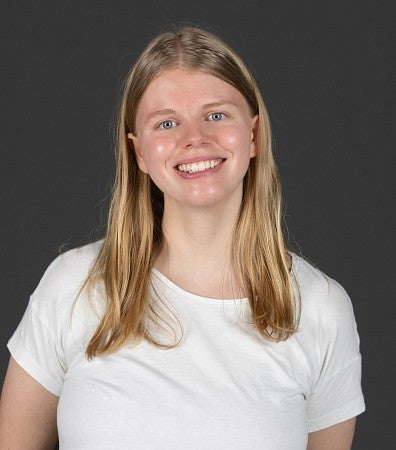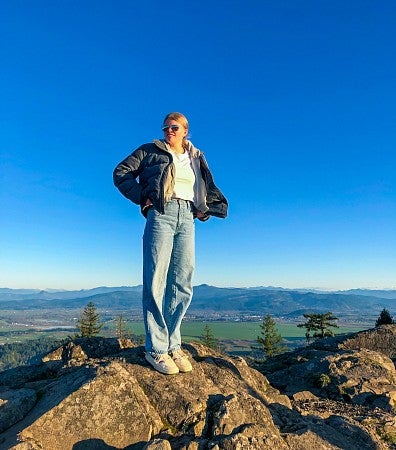Annika Nagat, MA ’24 of Germany studied advertising and brand responsibility as a master’s student while on exchange to the SOJC.
by Leo Heffron, Class of ’26

As a child, former master’s exchange student Annika Nagat felt like her hometown of Balingen, Germany was located at "the end of the world." The quiet village of around 1,000 people had no buses and limited ways to get around. To cure her boredom and isolation, she turned to nature. That connection became a source of comfort, then a mindset and eventually a career.
“I always appreciated nature and just going outside,” she said. “There was nothing else to do, but I also just really liked being out there.”
Balingen used to be blanketed in snow every winter. But as the seasons shifted and snow disappeared, Nagat started to notice what wasn’t being said. “We used to have a lot of snow and a ski lift. But we haven’t had snow in two years,” she said. “It’s scary when you realize something is changing, and you don’t fully understand it yet.”
That growing sense of climate awareness followed her into young adulthood. After finishing high school, Nagat worked for a year as a paramedic. But her curiosity about people, media and communication pulled her toward sustainable advertising — and ultimately to a one-year exchange to the UO School of Journalism and Communication (SOJC), where she studied with the Advertising and Brand Responsibility Master’s cohort while earning a master’s at Stuttgart Media University in Germany in corporate communications.
Turning sustainability into strategy
Nagat’s approach to sustainability isn’t about trends — it’s personal. “I’ve been a vegetarian since I was 5,” she said. “I just said I didn’t want to eat meat — and that hasn’t changed.”
That mindset has expanded into every part of her life, from choosing eco-conscious banks to skipping short flights in favor of trains. “Even my email runs on sustainable energy,” Nagat added.
While at the SOJC during the 2023–24 academic year, Nagat focused on how brands communicate those values to consumers. One of her projects explored how people respond to companies with a B Corp Certification — a label signifying strong environmental and social performance. The idea was sparked in a mass communication class with Professor Julie Newton.
“There was a brand that I really liked, and they advertised their clothes with the B Corp logo,” Nagat said. “I didn’t know what it was … so I basically asked myself: ‘Does anyone care about this?’”
That kind of questioning — about brands, values and responsibility — was central to her SOJC experience. “This felt like the perfect opportunity to bring sustainability into my professional career,” Nagat said. “Not just in a broad sense, but in asking questions: Is there a better way to do this? Can we push things forward?”
When she researched programs, she was surprised by what she found. “I didn’t expect a program like this in the States,” she said.
Nagat grew up viewing the U.S. from an outsider’s perspective. She observed the overconsumption and the immense amount of waste Americans produced.
But Eugene and the UO, although not perfect when it comes to sustainability, felt like they were headed in the right direction.

Courses delved into sustainable advertising
It wasn’t just the curriculum that appealed to her — it was the people. “I remember I talked to Professor Chris Chávez the first day I arrived,” Nagat said. “He was so passionate about communication, branding and sustainability.”
Chávez and Nagat’s bond strengthened during her time at UO. Originally, Nagat planned to stay only one term, but fell in love with the program and decided to finish the year.
“When she decided to stay for the whole year, that’s when I felt like she was invested in our program,” Chávez said. “She brought a global perspective to a global issue and was able to bring what she learned here back to Europe.”
One class that left a lasting mark was Brand Strategy with instructor Slavka Eberhart-Garah. Each week, students collected ads that intrigued them and presented their thoughts in a “show-and-tell” portfolio.
“It made me realize how much advertising we see — and how much of it I just don’t care about,” Nagat said. “Eberhart-Garah pushed us to bring our personality into the work. To think about what you want to tell the world.”
Another was the “culture jam” project in Chávez’s Brand Responsibility class, where students created parodies or critiques of consumer brands. “We criticized brands, or rather, the mass consumption that comes with them,” she said. “That was really impactful — it pushed me to think more critically.”
Even courses outside her comfort zone brought growth. “I always felt like I wasn’t good at creative things,” she said of Steven Asbury’s Design and Production class. “But he broke it down into small parts. Now I think of it like a puzzle waiting to be assembled.”
Supportive faculty made a difference
Though she appreciated Eugene’s progressive outlook, her experience in the U.S. and at UO still came with surprises, especially around transportation and consumption.
“In Germany, we don’t have plastic bags anymore,” she said. “We use paper bags or bring our own. It’s more natural to think about sustainability there.”
Public transit was another eye-opener.
“I was like, yeah, I can ride the bus,” she recalls thinking. “And then I did, and I was like, I can’t do this,” after seeing an armed passenger on the bus. “This is not how it is in Europe.”
Throughout her time in Oregon, she felt supported by faculty, peers and staff, including International Student and Scholar Services (ISSS). “They made this sometimes scary experience of living and studying abroad as comfortable as possible,” she said.
Landing a job in sustainable advertising
Today, she works for Bergfreunde — German for “mountain friends” — a company that blends her love of nature with her drive for responsible branding. Nagat works as a junior account manager for Bergfreunde, where she and her team manage campaigns for outdoor brands like Cotopaxi, a company she researched for her master’s thesis.
“The time I spent in Oregon pushed me toward wanting to work on something that I actually care about,” Nagat said.
Nagat’s love for the outdoors only grew while living in the Pacific Northwest, making it easy for her to leap into the sustainable advertising industry. Whether it’s her job or her daily choices, she keeps climate and conscience in focus.
Leo Heffron is a fourth-year journalism major at the SOJC, with a minor in Spanish. He loves to write about many topics, but fashion and social issues are his favorites. You can find his work in The Daily Emerald.
